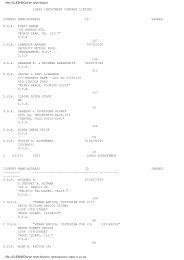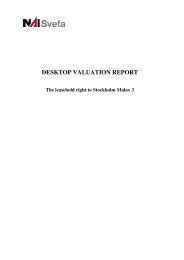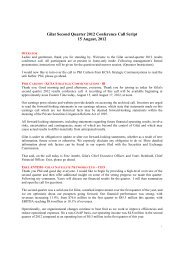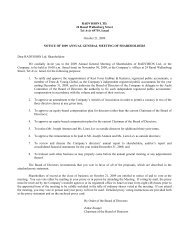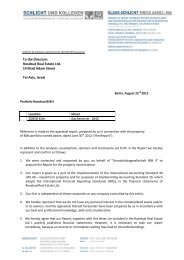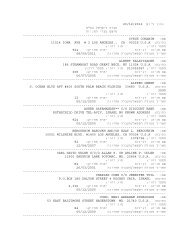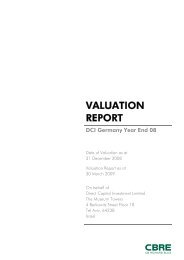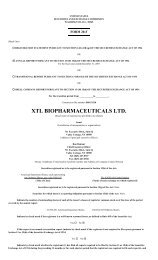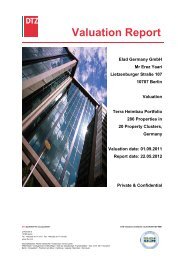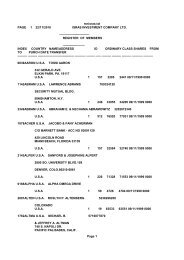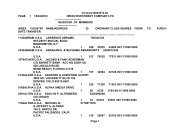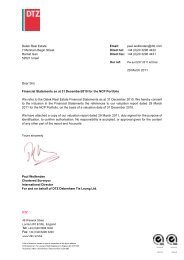RETALIX LTD.
RETALIX LTD.
RETALIX LTD.
You also want an ePaper? Increase the reach of your titles
YUMPU automatically turns print PDFs into web optimized ePapers that Google loves.
Revenues from on-line application, information and messaging services, are recognized as rendered in accordance with the provisions of Staff<br />
Accounting Bulletin No. 104 of the Securities and Exchange Commission.<br />
Deferred revenue includes advances and payments received from customers, for which revenue has not yet been recognized.<br />
Revenue results are difficult to predict, and any shortfall in revenue or delay in recognizing revenue could cause our operating results to vary<br />
significantly from quarter to quarter and could result in future operating losses. Should changes in conditions cause management to determine that these<br />
guidelines are not met for certain future transactions, revenue recognized for any reporting period could be adversely affected (see Note 1.k to our<br />
consolidated financial statements included elsewhere in this annual report).<br />
Goodwill and Intangible Assets<br />
On January 1, 2002, we adopted SFAS, No. 142, “Goodwill and Other Intangible Assets.” SFAS No. 142 requires that goodwill and intangible assets<br />
with an indefinite life be tested for impairment on adoption and at least annually thereafter. Goodwill and intangible assets with an indefinite life are<br />
required to be written down when impaired, rather than amortized as previous accounting standards required. Goodwill and intangible assets with an<br />
indefinite life are tested for impairment by comparing the fair value of the reporting unit with its carrying value. Fair value is generally determined using<br />
discounted cash flows, market multiples and market capitalization. Significant estimates used in the fair value methodologies include estimates of future<br />
cash flows, future short-term and long-term growth rates, weighted average cost of capital and estimates of market multiples of the reportable unit. If these<br />
estimates or their related assumptions change in the future, we may be required to record impairment charges for our goodwill and intangible assets with an<br />
indefinite life.<br />
The process of evaluating the potential impairment of goodwill is subjective and requires significant judgment. In estimating the fair value of a<br />
reporting unit for the purposes of our annual or periodic analyses, we make estimates and judgments about the future cash flows of that reporting unit.<br />
Although our cash flow forecasts are based on assumptions that are consistent with our plans and estimates we are using to manage the underlying<br />
businesses, there is significant exercise of judgment involved in determining the future cash flows attributable to each reporting unit. In addition, we make<br />
certain judgments about allocating shared balance sheet assets and liabilities to our reporting units. Within this context, we use judgment in considering our<br />
market capitalization, using among other factors, common rates within the industry as well as attributable to competitors. Changes in judgment on these<br />
assumptions and estimates could result in a goodwill impairment charge.<br />
We allocate the purchase price of acquired companies to the tangible and intangible assets acquired and liabilities assumed, based on their estimated<br />
fair values. Such valuations require management to make significant estimations and assumptions, especially with respect to intangible assets.<br />
Critical estimates in valuing certain intangible assets include, but are not limited to, future expected cash flows from customer relations, acquired<br />
developed technologies and trade names, and values of open contracts. In addition, other factors considered are the brand awareness and the market<br />
position of the acquired products and assumptions about the period of time the brand will continue to be used in the combined company’s product<br />
portfolio. Management’s estimates of fair value are based upon assumptions believed to be reasonable, but which are inherently uncertain and<br />
unpredictable.<br />
If we do not appropriately allocate these components or we incorrectly estimate the useful lives of these components, our computation of<br />
depreciation and amortization expense may not appropriately reflect the actual impact of these costs over future periods, which will affect our net income.<br />
During 2005, as a result of our annual impairment analysis, we determined that no goodwill of any of our past acquisitions was impaired.<br />
Should future results or economic events cause a change in projected cash flows or other assumptions, or should our business or operational strategies<br />
change, future determinations of fair value may not support the carrying amount of a reporting unit, and the related goodwill would need to be written<br />
down to an amount considered recoverable.<br />
45



